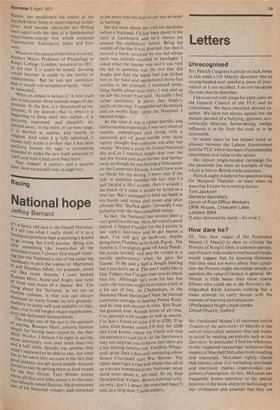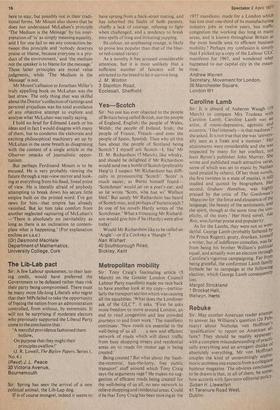How dare he?
Sir: Yes, how vulgar of Mr Ferdinand Mount (5 March) to dare to criticise the Provost of King's! Only a common person, out of touch with modern intellectual trends, would suggest that by assuring illiterates that they need not worry about their condition the Provost might encourage people to question the value of literacy in general. Mr Mount is little better than those coarse fellows who could see in the Provost's distinguished Reith Lectures nothing but a mean attempt to curry favour with the enemies of learning and education.
(Professor) Hugh Lloyd-Jones
Christ Church, Oxford
Sir) Ferdinand Mount's ill-informed article Treason of the anti-clerks (5 March) is the sort of smart-alick pedantry that one hopes to avoid by reading periodicals such as the Spectator. In particular, I find his references to the 'neglected vapourings' (whatever that means) of Marshall McLuhan both insulting and inaccurate. McLuhan rightly claims that literacy alone (i.e. excluding non-lineal and electronic media) impoverishes our powers of perception. In fact, McLuhan has frequently drawn attention to the special position of the book and print technology in our civilisation and asserted that they are
here to stay, but possibly not in their traditional forms. Mr Mount also shows that he does not understand McLuhan's principle 'The Medium is the Message' by his interpretation of `is' as simply meaning equality, and I for one fail to see any connection between this principle and 'nobody deserves praise or blame, because everyone is a product of the environment,' and 'the medium not the speaker is to blame for the message.' These latter principles are moral value judgments, while 'The Medium is the Message' is not.
Mr Mount's allusion to Jonathan Miller's truly appalling book on McLuhan was the last straw. The only thing that was skilful about the Doctor's collection of rantings and personal prejudices was his total avoidance of any objective attempt to explore and analyse what McLuhan was really saying.
I hold no brief for Edmund Leach or his ideas and in fact I would disagree with many of them, but to condemn the elaborate and exciting philosophical machinery set up by McLuhan in the same breath as disagreeing with the content of a single article in the Observer smacks of journalistic opportunism.
But perhaps Ferdinand Mount is to be excused. He is very probably viewing the future through a rear-view mirror and looking at everything from his fixed, lineal point of view. He is literally afraid of anybody attempting to break down his secure little empire built on the printed word. I've got news for him—that empire has already vanished. But let him take comfort from another neglected vapouring of McLuhan's —`There is absolutely no inevitability as long as there is an inclination to contemplate what is happening.' (For explanation enclose an s.a.e.) (Dr) Desmond MacHale Department of Mathematics, University College, Cork







































 Previous page
Previous page